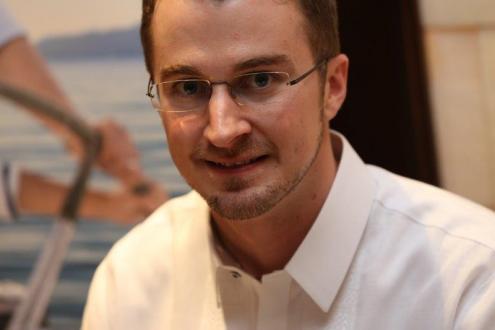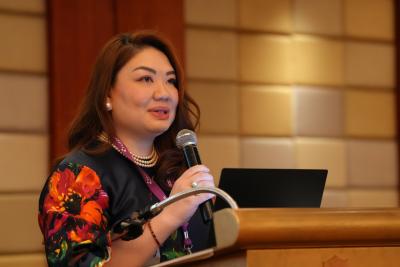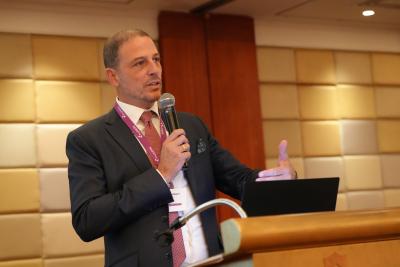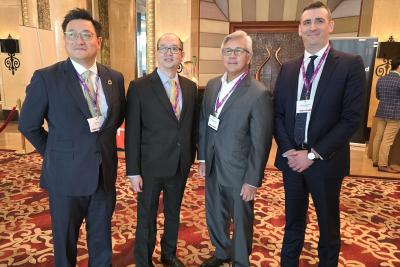The Philippines: A Major Market in Asia for Global Residence and Citizenship Alternatives
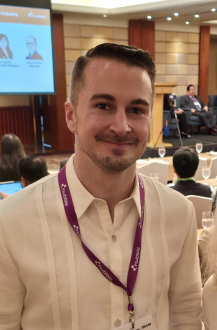
Scott Moore, IMCM of Henley & Partners
Jun 12, 2019
Investor migration consultancy Henley & Partners is involved in a rarefied world in which HNWIs and the ultra-wealthy can, through investment, purchase residence or, even better, citizenship in countries beyond their home borders. Scott Moore, Director and Country Head for the Philippines, along with Oudine Santos, Senior Manager located in Manila, presented both a talk and a Workshop to the assembled delegates at the Hubbis Philippines Wealth Management Forum. They explained why more of Asia’s HNWIs are taking this route, why Henley is the go-to firm for selecting and expediting such programmes, and why so many wealth management firms now work closely with Henley. They also reported that the Philippines is one of Asia’s most active markets.
“The wealthiest the most successful people are generally international,” Moore began, to quickly engage the interest of the attendees. “The world is seemingly becoming ever a more volatile and changing much faster than it did before. The world is moving to global citizenship for those able to afford it. Henley & Partners is a unique firm that is addressing the needs of this global citizen to improve quality of life, education potential, mobility, security and even enhance their tax position and regulatory compliance. The Philippines is one of our most important markets in the region.”
“The ability to live where you want, travel where you want, raise your children where you want and not limit your family to the fate of where you happen to be born, you actually get to choose,” Moore’s colleague Santos added. “We pride ourselves on being thoroughly professional, totally transparent and also very approachable and friendly. From the point of view of the clients, and we hear this from so many of their clients, the word ‘family’ comes up over and over again. What we accomplish for them, their success is our success.”
Henley’s long pedigree
Henley & Partners (Henley) opened its Singapore office more than five years ago and has seen a dramatic increase in business in the region. Henley has a history of more than 20 years and over 300 staff across the world in 32 offices handling alternative residence and citizenship options for HNWIs and their families, as well as advising on and helping structure programmes for governments, for example, Henley devised the flagship Malta programme, and a more recent assignment was to assist Moldova in such an endeavour.
Moore said Henley’s two decades of experience have allowed the first to build its unique expertise. The Henley business spans both private clients and also government advisory - in 2006, for example, the firm helped Caribbean country St. Kitts and Nevis, which had actually created the first such citizenship programme ever seen, back in 1984. The mission in 2006 was to redesign the programme and even helped them negotiate a visa waiver to the European Union.
He also highlighted Henley’s work on the flagship programme for Malta in the form of the Malta Individual Investor Programme. “Since inception that has brought in around EUR1 billion of foreign direct investment into Malta, which is very significant in relation to the roughly EUR12 billion GDP. And as of this year, EUR25 billion has been invested in Europe through the various residence and citizenship programmes, and it is growing substantially every year. And we are currently speaking with almost 30 governments around the world for similar programmes.”
“Henley is really the firm that created this industry, pioneering many of these programmes,” Santos commented. “We are not aware of any other company that has the knowledge of both sides of the equation so deeply, so intimately that they can really claim to be experts on both sides. We are experts on the government side, as Scott explained, as we helped devise and roll out many of the leading programmes and have great experience in working directly with the governments of these countries to activate and then fulfil their objectives.”
Working with wealth managers
To access wealthy individual or family clients, Henley has long experience of working with a variety of private banks and wealth management firms across the region, as well as with legal and other advisory and services firms to connect to clients.
“The firm works especially closely with independent firms and has a transparent remuneration arrangement for introductions from such firms on these initiatives,” Moore stated. “Henley’s business is not in any way competitive to the independent wealth management institutions, meaning that there are no barriers to wealth managers approaching them or referring their clients.”
“We are very eager to work with our partners here in the Philippines,” Santos added. “This has been a model that has been working for us for 20 years since we started partnering with the major private banks in Switzerland and now, we are partnering with people from our 33 offices across the world. We do have an office here in Manila, but we process our clients’ information out of Singapore for confidentiality reasons. We do not use any third parties. So, the information the client gives us will be kept in Singapore, it will be shared with the Henley office in the country of choice and of course with the government that we're dealing with in this country.”
Going global – the key drivers
Secondary residence or citizenship is an increasingly compelling story for wealthy business people and families from the Asia region. In an uncertain, ever-changing world, acquiring a second residence or citizenship is a wise investment decision and an insurance policy for the future. There are always political, geopolitical, and religious concerns for Asia’s HNWIs and their families.
Moore highlighted some recent data from a Knight Frank report, that showed that in fact in Asia HNWIs are the least likely to have multiple nationalities thus far. “There are accordingly a lot of opportunities here, and we are seeing a huge amount of growth in the market for obtaining alternative citizenship,” he reported.
Citizenship, or residence?
Moore then highlighted the opportunity to obtain either citizenship or residence. “With citizenship,” he explained, “you obtain a passport of that country and are protected under the constitution, you have the right to vote. I am a citizen of Canada, I am a resident of Singapore, but I am not a Permanent Resident here, so if I am no longer employed, I will have to leave. Accordingly, residence does not always mean a permit to stay.”
Citizenship, however, confers the same nationality on children and their offspring, meaning that wealth made in Asia can provide a platform for a different life for family heirs and their future generations.
Moore then highlighted some of the main citizenship programmes around the world, referring to an excellent PDF presentation [see link below]. He explained that Henley currently promotes nine citizenship programmes and with this range of options operates similarly to an advisory firm. “When I sit down with the client,” he explained. “I find out what their family situation is, and how much they can invest, we then come up with one or two recommendations that make the most sense for the clients.”
In the European Union, the firm promotes both Malta, Cyprus and Austria, while in the Caribbean, the options are the British Commonwealth countries of Grenada, St Kitts & Nevis, St Lucia and Antigua & Barbuda. And there are newer Eastern European options that have just come about in the past few months in the form of Moldova and Montenegro. “These last two countries are not part of the EU,” Santos noted, “although they could potentially be in the future. However, they definitely provide a very enticing option for clients in terms of citizenship.”
Singapore has an outstanding passport in terms of visa-free global travel and is remarkably stable, but other countries in the region, whether Bangladesh, Thailand, Indonesia or others have less flexible passports and can be more politically uncertain. Visa-free travel is therefore a core motivation compelling many of clients to seek residence or citizenship overseas.
If, for example, someone has European citizenship that offers access to all 28 EU states, plus Switzerland, it means that they have the freedom to settle in any EU country, it opens a world of opportunity to their families. Education of children and grandchildren is sometimes a core driver, as well as concerns about political stability and that is clearly a concern in some of the countries in this region. Another driver is global initiatives towards fiscal and tax transparency.
The Caribbean offers good value
The Caribbean offers excellent value for money and many vital advantages. Santos noted that the Caribbean passports which Henley can help clients obtain offer the lower cost alternatives. For between USD100,000 to USD200,000 an Asian HNWI would be able to bring his whole family in.
Moore added that the Caribbean option is popular due to elevated travel freedom. “Compared to the Philippines,” he reported, “you have far more countries you can enter without a visa. Grenada, for example, offers a visa waiver to the Schengen area. And also in Grenada, you actually have a visa waiver to China, so this has been very popular for some people in the region that do business in China.”
Henley actually focuses on four locations in the Caribbean that currently offer the most appropriate and effective packages. They are Grenada; Antigua and Barbuda; Saint Kitts and Nevis; and Saint Lucia. And one new forthcoming jurisdiction, Anguilla, soon to launch its own programme.
Moore highlighted certain key advantages of Grenada, including fast processing time, relatively inexpensive, visa-free travel to 131 countries including China, an E-2 Investor Visa Treaty (which has some advantages for the US), zero wealth, gift, inheritance, foreign income or capital gains tax and finally citizenship by descent.
Grenada requires either a contribution to the National Transformation Fund of USD150,000 for a single applicant or purchase of government approved and designated real estate with a value of at least USD350,000. If an investor chooses the real estate option, there is an additional flat government fee of USD50,000. There are other smaller fees associated with these applications.
Santos explained that Grenada’s attractions appeal to Filipinos, and showed a video giving insights into the islands and the citizenship programme. “Interestingly,” she noted, “the Grenada option is one of the most compelling citizenship programmes in the Caribbean, as well as enjoying advantages such as the largest offshore American medical university in the world.”
Once the client chooses the jurisdiction, the choice is the form of investments. “Should they invest in real estate, for example, or make donations to the government?” Moore pondered. “Real estate might be quite a big ask for something that is about 36 hours away by flight from Manila. But Henley has offices on the ground in each of these countries, we conduct due diligence on any real estate development prior to offering to our clients.”
Europe’s appeals
They then turned the spotlight on Europe, which is generally a more expensive option than the Caribbean. First up was EU member Cyprus. “This is the European programme that has been of most interest to my clients in the Philippines,” Moore reported. “The reason is it is an investment into an asset. You invest EUR2 million into residential real estate and you hold for five years. And right now, there’s an application cap of 700 people per year, and that limit will be hit in Q4 this year, which means potentially the government could raise prices again. If you make the right investment in Cyprus, you can pretty much pay for your citizenship with the appreciation on your asset.”
He also noted that the overseas lending rate on Euros right now is below 1%. “I see a lot of my clients when they buy property in Europe, they leverage their existing financial assets. With solid rental income and potential capital gain, this can a very efficient investment.”
The country, they explained, has plenty of advantages but has a relatively large minimum capital requirement of EUR2 million. Cyprus offers the opportunity for individuals to achieve tax residence through only spending 60 days per year in the country itself. It offers a 12.5% flat corporate tax, no tax on capital gains, no tax on interest, no tax on dividends and is one of the most tax effective jurisdictions in Europe.
Santos added that a further appeal is that there is a new casino development, what will be Europe’s largest casino, due for opening in 2021. With the Macau-based owner of City of Dreams as principal, the prospects for economic and property expansion are significant.
Malta: a leading European option with EU advantages
They turned to Malta, which they explained is a beautiful island with an excellent education system and a wonderful history.
Malta has the only European citizenship-by-investment programme that is currently endorsed by the EU and nationality is protected by European law. A new spouse may acquire citizenship in Malta after five years of Maltese citizenship and continuous relationship.
“We call Malta the ‘Rolls Royce’ of citizenship-by-investment programmes,” Moore reported. “It is certainly the most exclusive, as it has the most stringent due diligence and in terms of cost, it is probably actually the highest because the majority of the contribution amount that you can see is a donation to the government, so it is a sunk cost. It is like joining an exclusive club, like joining the Manila Golf Club as a parallel, very exclusive indeed.”
The process begins with EUR650,000 being paid to the government for the main applicant, plus EUR25,000 for their spouse, EUR25,000 for each applicant under 18 years old. The applicant must buy a property in Malta at a value of more than EUR350,000 or rent a property at more than EUR16,000 per year and must make contributions to a national bond fund of at least EUR150,000 and leave that money in for at least five years. And the applications must hold private health insurance. It is generally a 12-month process before citizenship documents and passports are issued.
Austria for the ultra-HNWIs
Santos then highlighted Austria, a country that Henley has recently begun working more closely with. But with a starting point of EUR8 million, it is definitely only for the very wealthy to consider.
Moore then mentioned two other programmes that have been introduced, Moldova and Montenegro. They are Eastern European countries not yet part of the EU, but they could be in the future for clients that are looking to perhaps hedge or invest. They are fairly cost competitive with the Caribbean examples and provide similar visa-free access to the Schengen and we actually had the opportunity to travel to Moldova at the end of last year, developing country in the European Union. Outstanding wine there. They used to produce some 90% of the Soviet Union’s wines, so we definitely enjoyed ourselves.”
Moldova, a low-cost alternative
Moldova offers visa-free travel to 121 countries without a visa and it is also a Commonwealth of Independent State country. This means that Moldovan citizens can go to Russia, Ukraine and Belarus without a visa. The citizenship programme is rapid and requires a donation of EUR100,000, plus extra for dependents up to a total of EUR155000 for a family of five or more. There is also a government contribution for the license of EUR35000 per applicant.
Residence by investment options
Moore turned to the more than 20 residence by investment programmes. While Canada used to be extremely popular with Asians, it is nowadays so extremely difficult to obtain residence there that other options are more appealing and more realistic. The most popular programmes, he reported, are today in Europe in Portugal and Greece.
Greece is the cheapest permit that you can get in EU right now, costing only EUR250000 in real estate investment, Santos noted. Greece, Moore added, offers a waiver to travel into the Schengen zone, so residents no longer have to apply for a Schengen visa. And while real estate has increased it is still 30% below pre-crash levels.
Portugal is very popular because it provides a clear and achievable path to citizenship. “Their residence by investment doesn’t get you the passport,” Santos explained, “and you still need to spend time in the country itself to earn the citizenship, but to be a legal resident under the Golden Visa for five years you need only spend seven days per year, which is very achievable even for entrepreneurs that have thriving businesses in Asia. After five years they can apply for citizenship, they just need to pass a basic language exam and then they can get a passport that is even better than that of Canada.”
Portugal requires only a EUR500,000 investment in residential real estate and can lead to a passport after 5 years of residence.
In Asia, Thailand is another residence option, especially for retirement. “As with Hong Kong and Singapore, Thailand is a single tax jurisdiction, so you are not paying any tax on your offshore income. Also, money that you remit into the country itself is tax-free as long as you can prove it’s from the income you had prior to the year of the remittance. So, relocating to Thailand as long as everything is structured right, you can live a pretty much a tax-free life and of course, Thailand is very friendly for expatriates.”
Singapore, yes, but tough nowadays
Also in Asia, Singapore has immense appeal. However, for the Singapore Global Investor Programme (SGIP) the individual must prove himself as an entrepreneur, showing a good track record for the last three years, he must own at least 30% of the company, which must have a turnover of at least SGD50 million in one year, and an average of SGD50 million for the last three years.
The individual can then offer at least SGD2.5 million to set up or expand an existing business in Singapore, or choose the family office option, which requires a family-worth of at least SGD400 million to set up.
“The Economic Development Board (EDP) scrutinises your background,” Moore noted. “The business also needs to be from an industry that the Singapore government likes, so, if you are in construction, or mining, it will be difficult, but if you are in technology, particularly fintech, they’ll roll out the red carpet. Moreover, just because you are making these investments it doesn’t mean that they will renew your PR after the first five years. You still have to hit certain milestones at your three and at your five years to show that you are growing your business, hiring more Singaporeans and increasing your expenditure. Of course, there is entry through establishing a business in Singapore or if you are lucky enough to find someone to sponsor your employment pass like Henley did for me.”
As the Workshop drew towards a close, one delegate asked how many passports an individual can hold. “A good question,” Moore replied, “and the answer is it varies, country by country. In Singapore, only one, the home passport, is permitted. In some countries, you can hold more. Here in the Philippines, as long as you were born a Filipino and not a naturalised Filipino then there is no restriction. The most passports I know of in one hand is six.”

Managing Director at Henley & Partners
More from Scott Moore, IMCM, Henley & Partners
Latest Articles


